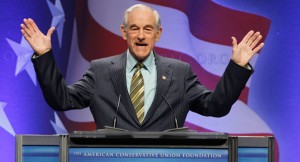
By Nate Currie
As a right winger, I’ll concede that I don’t completely understand Republican presidential candidate Ron Paul or his platform. Indeed, some of his ideas and beliefs, for example, that heroin should be legalized and that states should have the right to secede seem downright off the wall. Yet it is fairly obvious, regardless of party affiliation, when someone in the political limelight gets cheated by the mainstream media and such was the case in August, during Iowa’s Ames Straw Poll.
Conducted under intense media scrutiny, the poll awarded Republican Michelle Bachmann victory and placed candidates Rick Perry and Mitt Romney as the near frontrunners. Ron Paul, meanwhile, was largely ignored; a Wall Street Journal editorial even went so far as to suggest that his placing in the poll was by and large a dismissal. “Libertarian Ron Paul,” they wrote, “who has no chance to win the nomination, finished a close second (The Wall Street Journal, “Bachmann-Perry Overdrive).” Yet such an observation does not do Paul justice; not by a longshot. In actuality, he lost to Bachmann by a mere nine-tenths of a single percentage point; in this case, roughly 150 votes out of the 16,900 votes cast. In a real election, such a close loss who almost certainly have called for a recount (one can’t but help reminiscing of the 2000 presidential election and the debacle over Florida’s Bush-Gore votes).
This is not to discredit straw polls, however, which are merely to determine what is probably on the mind of voters. That being the case, an unbiased examination of the Ames poll would consequently determine that Republicans strongly favor both Bachmann and Paul. True, many would argue that straw polls are merely organized fraud since campaigns often purchase tickets and disperse them among close followers, showing not the true beliefs of various parties but merely demonstrating their abilities to organize and consolidate supporters. Yet if this is the case, and it seems a logical one, why was Paul discredited for his organizational skills and Bachmann thrown into the spotlight?
After Ames, Bachmann was invited to appear on five major television networks while Paul was nowhere to be found. In fact, to most media organizations he remained somewhat of a novelty. The bottom line is this: if Bachmann’s number one spot in the poll succeeded in showering her with massive amounts of public attention and media heralding why did Paul’s almost-tie merely put him on the back burner? When questioned by POLITICO on the aftermath of the Ames poll Paul admitted that “It did disturb me but was not a total surprise,” adding that “The result at Ames was significant; it might well have propelled us to the top tier. The media cannot change that (POLITICO, “Ron Paul remains media poison”).”
Unfortunately for Paul and his campaign, the media can and does change the political ball game drastically. After all, it is the media who holds power over determining who is in the top tier. In his interview with Kasie Hunt of POLITICO, Paul went on to note that it seemed hard for the media to accept him as a major contender and admitted that he was shocked when a national program that he was scheduled to speak on was cancelled. Such a conundrum is not caused by the fact that Paul placed second, the POLITICO noted; one must merely remember, they wrote, Mike Huckabee who, in 2008 lost to Mitt Romney by roughly 13.5 percentage points yet managed to reverse the loss into an Ames victory and become a media sensation.
Though many of Paul’s adherents seem to believe there is a media conspiracy against him, such theories are highly unlikely. Too, politicians do not get in the media spotlight merely as a result of such straw polls as the Ames. At the end of the day, the media cannot be blamed. Indeed, the Washington Post reported a number of Republicans to have claimed that if Paul had defeated Bachmann in the Ames it would have damaged the credibility of such polls. The most unsettling thing about the Post report is simply that there are major players in a political party who believe that if one candidate is victorious the poll should count while if another wins, the poll should be discredited.






